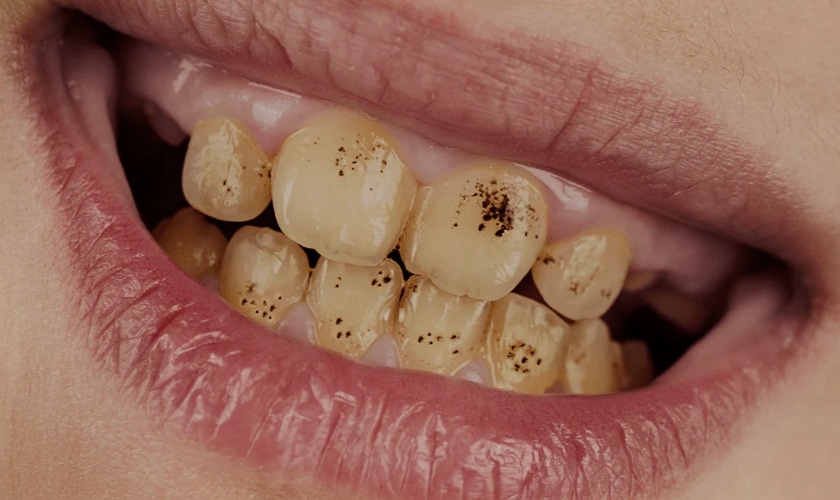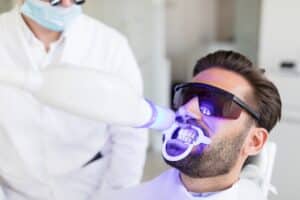Black spots on teeth can be a cause for concern, as they may indicate underlying dental or health issues. Understanding the potential causes can help you take the appropriate steps to address and prevent these spots. Here are ten common reasons why black spots might appear on your teeth.
1. Dental Caries (Cavities)
Dental caries, commonly known as cavities, are one of the most common causes of black spots on teeth. Cavities form when tooth enamel is eroded by acids produced by bacteria in the mouth, leading to decay. As the decay progresses, it can appear as black or brown spots on the teeth.
Prevention: Maintain good oral hygiene by brushing twice a day, flossing daily, and visiting the dentist regularly for check-ups and cleanings.
2. Tartar Buildup
Tartar, or dental calculus, is hardened plaque that can form on the teeth. It can appear as yellow, brown, or black spots, especially near the gum line. Tartar is caused by poor oral hygiene and cannot be removed by brushing alone.
Prevention: Regular professional cleanings by a dentist or dental hygienist can help prevent and remove tartar buildup.
3. Staining from Foods and Drinks
Certain foods and drinks can stain the teeth over time, leading to black or dark spots. Common culprits include coffee, tea, red wine, and dark-colored berries. These stains are usually superficial but can be persistent.
Prevention: Limit the consumption of staining foods and drinks and rinse your mouth with water after consuming them. Regular brushing and professional cleanings can help remove surface stains.
4. Tobacco Use
Smoking or using other tobacco products can cause significant staining on teeth. Nicotine and tar in tobacco can lead to yellow, brown, or black discoloration.
Prevention: Quitting smoking and avoiding tobacco products can prevent further staining and improve overall oral health.
5. Trauma or Injury
Injury to a tooth can cause internal bleeding or damage to the pulp, leading to dark discoloration. This can occur from accidents, falls, or sports injuries.
Prevention: Wearing a mouthguard during sports and being cautious to avoid trauma to the mouth can help prevent injury-related discoloration.
6. Certain Medications
Some medications, such as certain antibiotics (e.g., tetracycline), can cause discoloration of the teeth when taken during tooth development. This can result in gray, brown, or black spots on the teeth.
Prevention: Consult with your healthcare provider about the potential side effects of medications and explore alternatives if possible.
7. Dental Restorations
Old or deteriorating dental restorations, such as amalgam fillings, can cause discoloration over time. These spots may appear black or gray and can be a sign that the restoration needs to be replaced.
Prevention: Regular dental check-ups can help monitor the condition of dental restorations and ensure they are replaced as needed.
8. Tooth Decay Under Crowns or Fillings
Decay can occur under dental crowns or fillings if they are not properly sealed or maintained. This decay can appear as black spots around the edges of the restoration.
Prevention: Good oral hygiene and regular dental visits are essential to monitor and maintain dental restorations and prevent decay.
9. Fluorosis
Dental fluorosis is caused by excessive fluoride intake during tooth development. It can lead to white, brown, or black spots on the teeth. Fluorosis is typically a cosmetic issue and does not affect the function of the teeth.
Prevention: Ensure your drinking water has appropriate fluoride levels and use fluoride-containing products as recommended by your Keller dentist.
10. Genetic Factors
In some cases, black spots on teeth can be attributed to genetic factors. Certain genetic conditions can affect the color and development of tooth enamel, leading to discoloration.
Prevention: While genetic factors cannot be prevented, maintaining good oral hygiene and regular dental care can help manage the appearance of discoloration.
If you notice black spots on your teeth, schedule a dental appointment. The dentist can diagnose the cause and recommend the best treatment. This might involve professional cleaning, teeth whitening, replacing old fillings, or addressing any underlying dental problems.
Maintaining good oral hygiene, limiting staining foods and drinks, and quitting smoking can all help prevent future black spots. Remember, early detection and treatment are key to a healthy smile.





